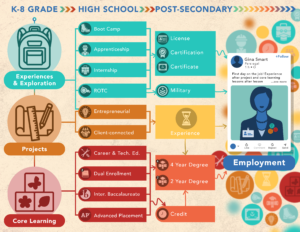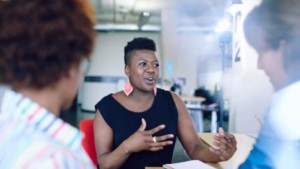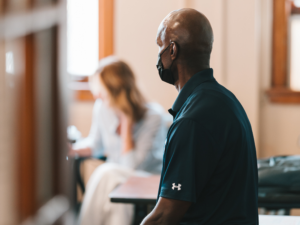World Teachers’ Day 2017

Today is annual World Teachers’ Day, a UNESCO initiative devoted to appreciating, assessing and improving the educators of the world.
In honor of the day, our team took a moment to reflect on the educators we were lucky enough to cross paths with at some point in our lives–the ones we will never forget, who made a difference, inspired us to work hard and helped us become future ready.
Adam Kulaas, Director
I have been extremely fortunate to be inspired to be a lifelong learner from a variety of educators, from my earliest school days until the present. I will highlight two, beginning with Mrs. Pursley from Puyallup High School, who taught me to value lessons of the past by bringing all aspect of literature to life. From the creation of poetry to applauding my desire to walk across desktops during our Shakespeare unit continues to inspire me to think beyond the box and bring learning to life.
I’ll also include Dr. Thyfault of Central Washington University. Her rigorous expectations for every educator that she mentored and taught continue to change lives long after her passing. Her passion for each and every whole child and demand for creativity in designing personalized opportunities for them to exceed was infectious in fueling a mindset of continuous growth and continues to be a presence in my desire to design.
Allie Brumley, Director
Highlighting just one educator would be hard as there were many that helped shape my path forward. Some came in the form of teachers while others were mentors–teaching me compassion, diligence, hard work and dedication.
I struggled with direction in college and after completing my AA in high school with the Running Start program, I found myself coming in two years ahead of my peers and not totally sure what I wanted to do. I entered the Family Studies program, sure that helping people was the right direction.
The head of the department was pivotal in helping me find my path forward and helping me navigate the class offerings to be sure I was headed in the right direction. While I thought for sure I’d be in Social Services, I use my focus of study everyday in my line of work and am so grateful for her guidance.
Caroline Vander Ark, COO
As the world began to get online, I started fifth grade and my life was changed. Mr. Wezeman advocated for our classroom to have a much higher student to computer ratio than typical, so I learned computer skills that helped me all the way through school and my first few jobs.
We learned how to research and trust a source and present an argument in a thoughtful manner. He was doing project-based and competency-based learning before we had papers to define them. It was the first time I felt like someone challenged me to learn how to think, instead of just memorizing and repeating. He allowed us to struggle and taught us about growth mindset.
Catherine Wedgwood, Manager
I was really blessed to have the same amazing elementary school teacher for both second and third grade. Mrs. Ketchum was an educator who truly cared about her students. She made it a point to get to know every single student on a personal level, and still remembers all of her students’ names and something about them to this day (she’s even one of my Facebook friends).
There are so many skills I learned in her classroom, but the most important thing I learned was acceptance. Acceptance of others no matter their background, what they looked like or their mental or physical ability. Acceptance of those whose opinions are different than mine, as well as how to embrace those differences as a wonderful part of life on this planet.
I learned the regular subjects like Math and English in Mrs. Ketchum’s classroom, but I also learned how to simply be a good person–to work hard and be kind. The social and emotional skills that she instilled in all of her students have served me well and definitely made me future-ready for college, career and life.
Emily Liebtag, Director
Mr. Laughlin and Mr. Kozack at Whisconier Middle School in Brookfield, Connecticut made the science lab tech-rich and encouraged us to use the computers to document lab notes, collect data, etc. They encouraged us to come in and use the lab as much as we wanted, including for other classes.
This was my first foray into using technology other than to play Oregon Trail or Nintendo at home with my brothers. It showed me how to try, take-risks and that I wasn’t going to “mess things up” by exploring on the computer. Being future-ready to them meant preparing us to be risk-ready, too.
Erik Day, Coordinator
When I was in college, I took a class that took the form of a 10-week simulation of the six-party talks. The class was divided into six groups of four, each group representing one nation’s interests in the weekly plenary session. Throughout the rest of the week, we would be left to our own devices in terms of negotiating and arranging meetings to drive progress and hopefully reach an agreement on how to end North Korea’s nuclear pursuits by the end of the quarter.
At the end of the course, our class did not reach an agreement (our instructors, former ambassadors playing the role of North Korean government, had instructed the North Korean delegation to not sign on to the final agreement), so I went to one of the professors to see what I (a representative of the Chinese delegation) could have done differently.
“You have a frog in your throat, and your voice is going to annoy people in the professional world. Also, you should work on your people skills–success isn’t just about reaching a logical conclusion. You have to be able to work empathetically with others in order to get them to go along with you if you want to affect change.” The second half of his recommendation, while maybe a bit hypocritical in light of the first half, was instrumental in my shift from an “engineering mindset” to a “21st-century skills” mindset.
Janice Walton, Project Manager
In graduate school I was challenged by my professor, Dr. Ruth. I submitted a paper to him, which I will admit I had procrastinated in writing, and did not mince words when he told me what he thought of the piece. To this day I still have that paper, and his email, because they fueled me to always do better.
He wrote, “Janice you have a very analytical mind and you showed it in this paper. However, I sensed a certain hurried quality about it and found a lot of small errors.” He went on to say, “I found a few of your sentences difficult to understand in their context.”
He was right, and I was busted. I thought I could operate as usual, wait to the last minute, throw something together and get a good grade. He showed me that wasn’t the case, but his grace in doing so also allowed me to be more receptive to his criticism. By starting with the fact that he knew I could do better, he showed that he cared about me as a student. He encouraged me to not only show him that I could better but show myself that I could.
His words have prepared me for work and life because they remind me to first and foremost take time and care in all that I do, especially my writing. Your writing communicates to people the way you feel, the knowledge that you have, and sometimes it will be the only way people come to know you. Being mindful of that is what Dr. Ruth taught me and I am forever grateful.
Jessica Slusser, Project Manager
Hands down, the most influential and powerful educator during my school years was Mr. Petterson. He was an advocate for students, a powerful mentor and was the only person who could help me really figure out and understand tough math concepts (well, they were all tough for me).
Most importantly, Mr. Peterson never let me give up on myself. He was a teacher and a friend and helped us all see the real world connections for the concepts we were mastering.
Mary Ryerse, Director
Even before I was old enough to appreciate it, Mr. Dave Baumann (Mr. B) taught me–and a lot of others–that “people can do a lot more than they think they can.” He’s been a lifelong educator and I was fortunate to have him as a swim coach and mentor starting at age six. I recently came across something Mr. Baumann wrote (circa 1974, in purple ink from a ditto machine):
Much of teaching is encouraging–encouraging the kids to try to break away from their fears of the unknown. That’s one of the reasons we see smiles on the faces of young people after they’ve done something they didn’t think they could do. They conquered a fear. That’s why we teach kids that they can do more than they think they can. When young people feel good about themselves, it carries over to their relationships with other people.
Today, we have lots of social and emotional (SEL) language around those concepts. I’m thankful Mr. B. didn’t wait for that language to start teaching in powerful ways.
For more, see:
- Addressing Teacher Shortage: One Possible Solution, High Quality Online Learning
- 100 Education Hashtags for Teachers and EdLeaders
- Help Us Celebrate Super Teachers!
Stay in-the-know with all things EdTech and innovations in learning by signing up to receive the weekly Smart Update.







0 Comments
Leave a Comment
Your email address will not be published. All fields are required.